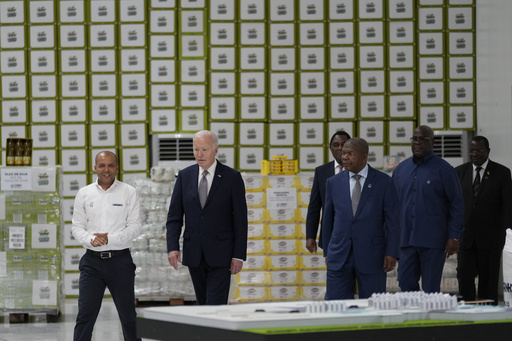LUANDA, Angola — President Joe Biden’s long-anticipated visit to Africa marked a significant occasion with all the elements typical of a state visit, including a 12-cannon salute, amiable exchanges with Angolan President João Lourenço, and celebratory music that filled the atmosphere. However, the trip was overshadowed by unanswered questions from the press regarding his recent controversial pardon for his son, Hunter Biden. When reporters sought clarification on this unexpected decision, Biden humorously deflected by pointing at Lourenço and quipping, “Welcome to America.”
In his remarks, Biden acknowledged Lourenço’s efforts to enhance U.S.-Angola relations and underscored the importance of Africa’s vibrant youth demographic, suggesting it would play a vital role in shaping the future of the globe. He also expressed his enthusiasm for a significant railway initiative, stating that this project could transform business operations across the continent.
Biden’s interaction with the media was markedly restrained during the journey, which kicked off on a Sunday evening and included brief stops in Cape Verde, in addition to his engagements in Angola. Apart from a few comments about the political landscape in South Korea, he largely evaded media inquiries throughout the trip, reminiscent of his previous visit to South America a month ago.
Following his announcement of the pardon just before boarding Air Force One for Africa, it was White House press secretary Karine Jean-Pierre who addressed the situation with reporters hours later. She faced a barrage of questions and explained that although Biden respects the justice system, he believes that politics had influenced the charges against his son, adding, “enough was enough.” While she maintained that Biden was not contradicting himself by holding both views, she did not shy away from the difficult queries about the politics of the decision.
During his official discussions with Lourenço, Biden emphasized that the U.S. is “all in on Africa,” praising the robust relationship between Angola and Washington. His administration has committed billions to Angola, with the Lobito Corridor project standing out as a key investment aimed at revitalizing supply chains across 800 miles of train lines connecting Angola, Zambia, and Congo. The progress made over the past generation in Angola, once marred by civil unrest and foreign intervention during the Cold War, is seen as impressive.
Angola, rich in oil and located on Africa’s southwest coast, gained independence from Portugal in 1975, but the scars of civil war still influence its contemporary society. Even today, the national flag carries symbols reminiscent of its past ties to the Soviet Union. As Biden nears the end of his term in office, there are emerging concerns among African leaders like Lourenço about a future shift in U.S. leadership that could favor a return to policies favoring a Trump administration.
Biden expressed admiration for Lourenço’s efforts to strengthen bilateral ties and proclaimed that Africa’s youth would provide a pathway to global transformation. He also took the opportunity to visit the national slavery museum, drawing attention to how both nations, once connected through the painful history of slavery, now share the promise of economic growth and partnership.
However, it appears that if Biden intended to solidify his foreign policy achievements during this visit, the realization of those goals may rest in the hands of his political adversary, Donald Trump, who seeks a political comeback after losing the 2020 election. The future of U.S.-Africa relations and the continuation of initiatives like the Lobito Corridor could hinge on the next administration’s perspectives and policies going forward.
Copyright @2024 | USLive | Terms of Service | Privacy Policy | CA Notice of Collection | [privacy-do-not-sell-link]


